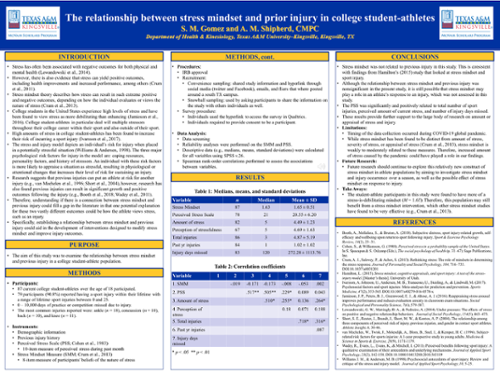Stress has often been associated with negative outcomes for both physical and mental health (Lewandowski et al., 2014). However, there is also evidence that stress can yield positive outcomes, including health improvements and increased performance, among others (Crum et al., 2011). Stress mindset theory describes how stress can result in such extreme positive and negative outcomes, depending on how the individual evaluates or views the nature of stress (Crum et al., 2013). College students in the United States experience high levels of stress and have been found to view stress as more debilitating than enhancing (Jamieson et al., 2016). College student-athletes in particular deal will multiple stressors throughout their college career within their sport and also outside of their sport. High amounts of stress in college student-athletes has been found to increase their risk of incurring a sport injury (Ivarsson et al., 2017). The stress and injury model depicts an individual’s risk for injury when placed in a potentially stressful situation (Williams & Andersen, 1998). The three major psychological risk factors for injury in the model are: coping resources, personality factors, and history of stressors. An individual with these risk factors is more likely to appraise a situation as stressful, resulting in physiological or attentional changes that increases their level of risk for sustaining an injury. Research suggests that previous injuries can put an athlete at risk for another injury (e.g., van Mechelen et al., 1996; Short et al., 2004), however, research has also found previous injuries can result in significant growth and positive outcomes following the injury (e.g., Booth et al., 2018; Wadey et al., 2011). Stress mindset was not related to previous injury in this study. This is consistent with findings from Hamilton’s (2015) study that looked at stress mindset and sport injury. Although the relationship between stress mindset and previous injury was nonsignificant in the present study, it is still possible that stress mindset may play a role in an athlete’s response to an injury, which was not assessed in this study. The PSS was significantly and positively related to total number of sport injuries, perceived amount of current stress, and number of injury days missed. These results provide further support to the large body of research on amount or appraisal of stress and injury.
Faculty Mentor: Dr. Amber Shipherd
Department of Health and Kinesiology


